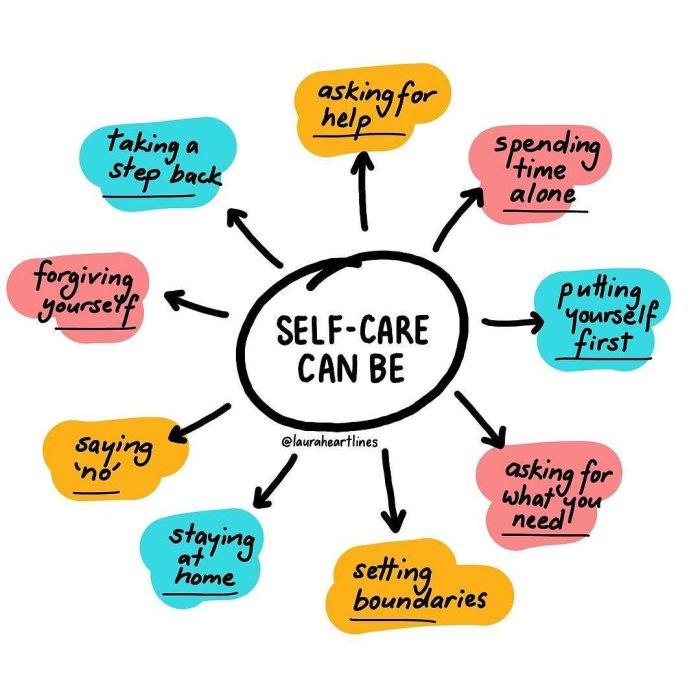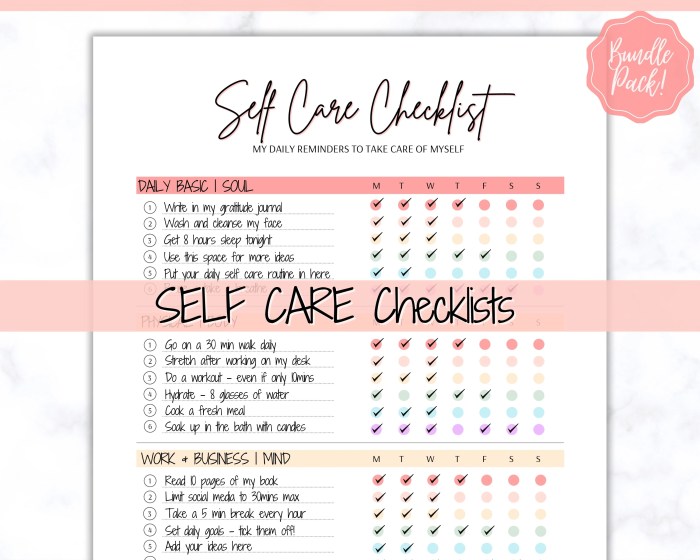Self-Care Routine Ideas takes center stage, inviting you into a world of well-being. Get ready to explore various self-care practices and tips that will elevate your daily routine.
From physical activities to mental and emotional strategies, this guide will help you prioritize self-care like never before.
Self-Care Practices
Self-care is essential for maintaining overall well-being and involves activities that promote physical, mental, and emotional health. Incorporating self-care practices into your routine can help reduce stress, improve mood, and increase productivity.
Exercise Regularly
- Engage in physical activities such as walking, jogging, yoga, or dancing to boost endorphins and improve overall health.
- Try to incorporate at least 30 minutes of exercise into your daily routine to promote better sleep and reduce anxiety.
Practice Mindfulness and Meditation
- Take time to focus on the present moment through mindfulness techniques or meditation to reduce stress and enhance mental clarity.
- Deep breathing exercises can help calm the mind and improve overall well-being.
Get Sufficient Sleep
- Ensure you are getting 7-9 hours of quality sleep each night to improve cognitive function, mood, and overall health.
- Establish a bedtime routine and create a relaxing sleep environment to promote better sleep hygiene.
Connect with Loved Ones
- Spending time with friends and family can provide emotional support and strengthen relationships, enhancing overall well-being.
- Engage in meaningful conversations and activities with loved ones to boost mood and reduce feelings of loneliness.
Practice Self-Compassion
- Be kind to yourself and practice self-compassion by acknowledging your strengths and weaknesses without judgment.
- Avoid self-criticism and negative self-talk, and instead, focus on self-acceptance and self-care.
Physical Self-Care

Taking care of your physical well-being is crucial for maintaining overall health and happiness. Engaging in physical self-care practices can have a significant impact on your mental health, helping to reduce stress, improve mood, and boost self-esteem. Here are some examples of physical self-care routines and tips on creating a personalized plan:
Examples of Physical Self-Care Routines
- Exercise: Regular physical activity, whether it’s going for a run, hitting the gym, or practicing yoga, can help release endorphins and reduce feelings of anxiety and depression.
- Yoga: Incorporating yoga into your routine can not only improve flexibility and strength but also promote relaxation and mindfulness, benefiting both your physical and mental well-being.
- Dancing: Dancing is a fun and engaging way to stay active while also boosting your mood and reducing stress. Whether you join a dance class or simply dance to your favorite tunes at home, it can be a great form of physical self-care.
Impact of Physical Self-Care on Mental Health
Physical self-care practices can help regulate emotions, improve sleep quality, and enhance overall well-being by promoting the release of feel-good hormones like endorphins and reducing the levels of stress hormones in the body.
Tips for Creating a Personalized Physical Self-Care Plan
- Find activities that you enjoy: Choose physical activities that you find enjoyable and fulfilling to ensure that you stay motivated and committed to your self-care routine.
- Set realistic goals: Start small and gradually increase the intensity or duration of your physical activities to avoid burnout and maintain consistency.
- Listen to your body: Pay attention to how your body feels during and after physical activity, adjusting your routine as needed to prevent injury and ensure your well-being.
Mental and Emotional Self-Care
Taking care of your mental and emotional well-being is just as important as caring for your physical health. It involves strategies to manage stress, practice mindfulness, and promote emotional well-being.
Managing Stress and Practicing Mindfulness, Self-Care Routine Ideas
When it comes to managing stress, practicing mindfulness can be incredibly beneficial. Mindfulness involves being present in the moment and focusing on your thoughts and feelings without judgment. This can help reduce stress and anxiety levels, leading to a greater sense of calm and clarity in your mind.
Role of Journaling or Therapy
Journaling can be a powerful tool for mental and emotional self-care. Writing down your thoughts and feelings can help you process emotions, gain insight into your inner world, and track patterns in your behavior. Therapy, whether individual or group, can also provide a safe space to explore your emotions, gain coping strategies, and work through challenging issues with the help of a trained professional.
Promoting Emotional Well-Being
Setting boundaries is essential for promoting emotional well-being. Learning to say no when you need to, prioritizing your needs, and surrounding yourself with supportive people can help protect your emotional health. Practicing gratitude is another effective technique for enhancing emotional well-being. Taking time to reflect on the things you’re grateful for can shift your perspective and improve your overall mood.
Social and Relationship Self-Care: Self-Care Routine Ideas

Building and maintaining healthy relationships is essential for overall well-being. Nurturing these connections can positively impact your mental and emotional health, providing a support system during difficult times.
Nurturing Healthy Relationships
Healthy relationships are built on trust, communication, and mutual respect. To nurture these connections, make time for meaningful interactions with loved ones. Listen actively, show empathy, and express gratitude for their presence in your life.
- Plan regular date nights or hangouts with friends and family.
- Communicate openly and honestly about your thoughts and feelings.
- Support each other’s goals and aspirations.
Setting Boundaries
Setting boundaries is crucial for maintaining your mental and emotional well-being. It’s okay to say no to things that drain your energy or make you uncomfortable. Boundaries help protect your sense of self and preserve your emotional reserves.
- Communicate your boundaries clearly and assertively.
- Recognize when a relationship becomes toxic and be willing to distance yourself if necessary.
- Prioritize your needs and well-being above pleasing others.
Balancing Social Interactions
While social interactions are important, it’s also essential to find a balance that works for you. Avoid spreading yourself too thin and prioritize quality over quantity in your relationships. Quality time spent with loved ones can be more fulfilling than constant socializing.
- Schedule alone time for self-reflection and relaxation.
- Be selective about the social events you attend and prioritize those that bring you joy.
- Check in with yourself regularly to assess your emotional state and make adjustments as needed.
